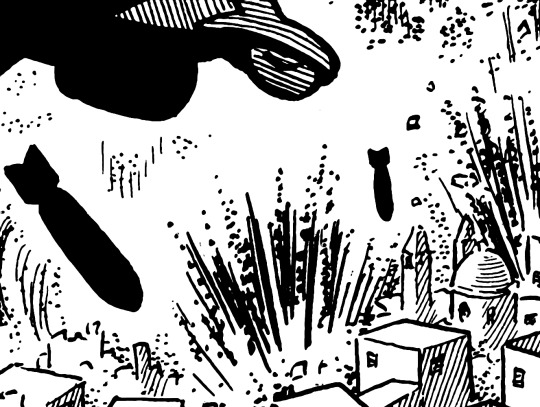#joe sacco
Text

Joe Sacco, The War in Gaza 1.31.24 (excerpt)
330 notes
·
View notes
Text
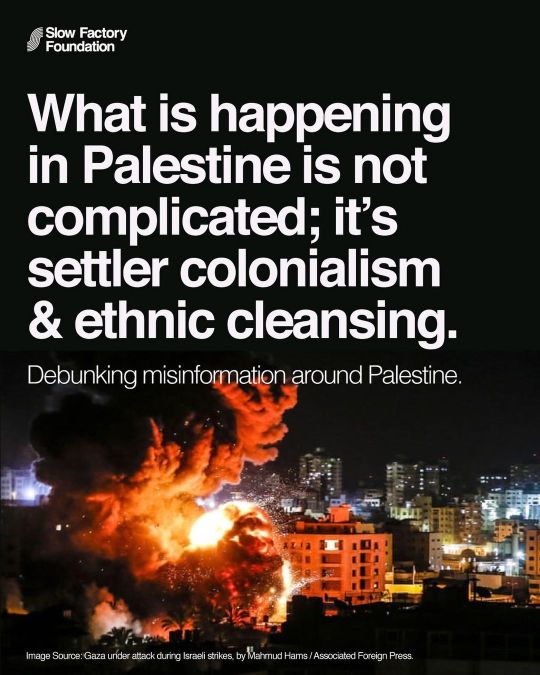

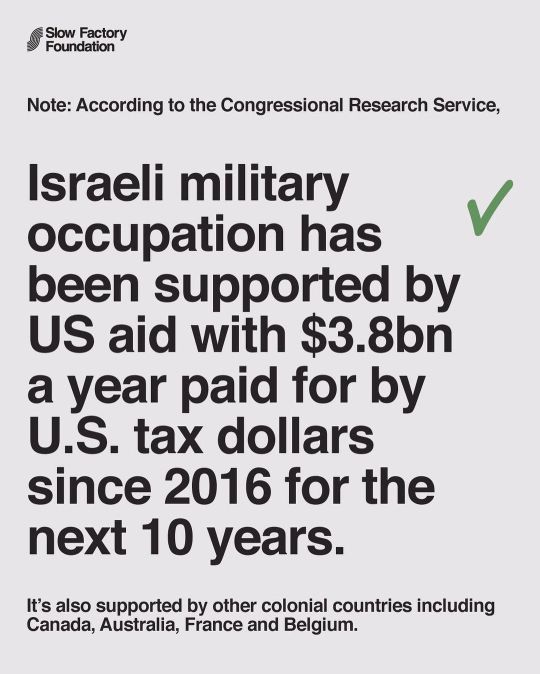
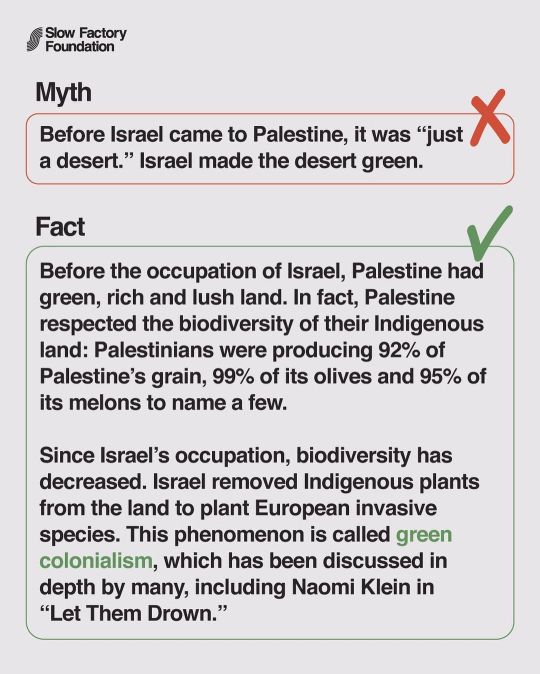
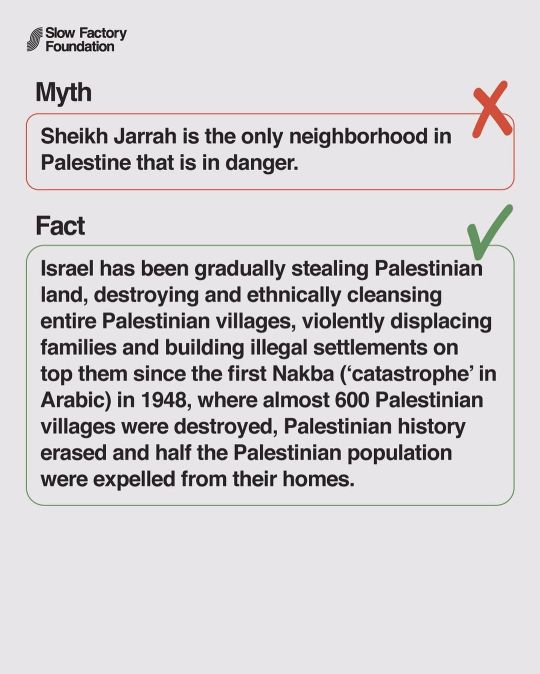
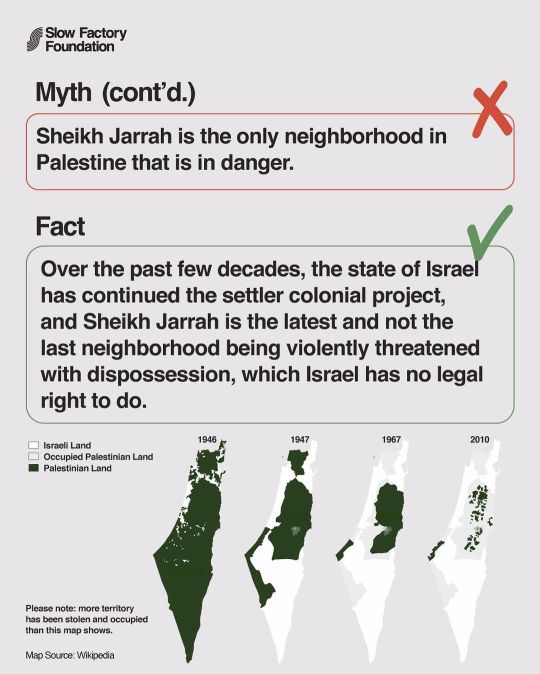
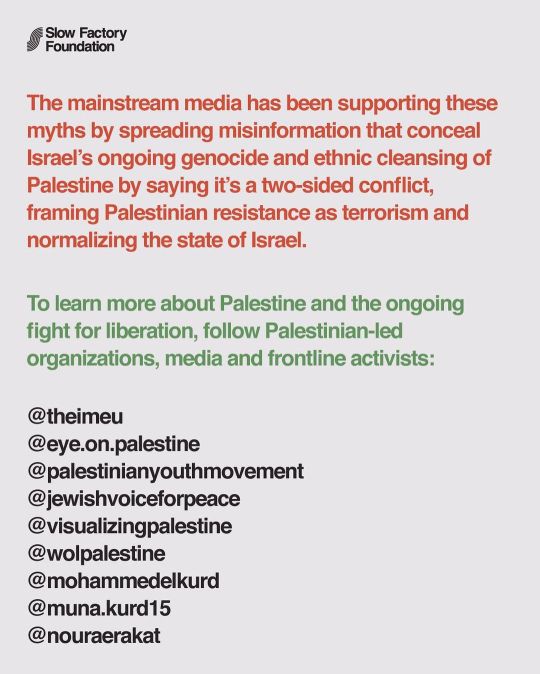
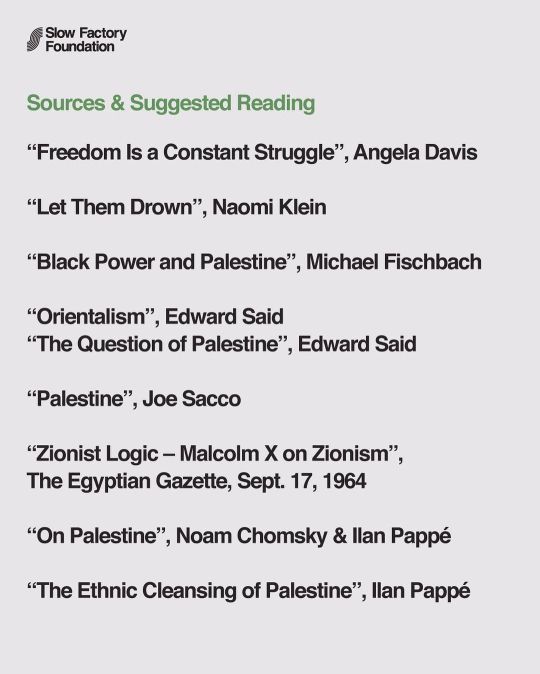
[This post is a series of images from an infographic by the Slow Factory Foundation originally posted May 2021. The first image is a photo with text over it. The photo shows a massive fireball in the middle of a group of buildings, with a massive black cloud rising from the flames that is bigger than the buildings themselves. The building just behind the fireball is low, rectangular, and lit up bright orange. Behind that building, there is a city lit up at night. Hundreds of buildings stretching into the distance, a thousand glimmering lights.]
What is happening in Palestine is not complicated; it's settler colonialism & ethnic cleansing.
Debunking Misinformation around Palestine.
Myth ❌
Palestine and Israel are in "conflict."
Fact ✅
What is happening in Palestine is settler colonialism, military occupation, land theft and ethnic cleansing. A conflict means there is equal footing, which is not the case. There is an active oppressor (Israel) and an oppressed (Palestine). A colonizer (Israel) and a colonized (Palestine). This is not a conflict.
[Three images of headlines with the word 'conflict' crossed out in red ink.]
Note: According to the Congressional Research Service,
Israeli military occupation has been supported by US aid with $3.8bn a year paid for by U.S. tax dollars since 2016 for the next 10 years.
It's also supported by other colonial countries including Canada, Australia, France and Belgium.
Myth ❌
Before Israel came to Palestine, it was "just a desert" and Israel made the desert green.
Fact ✅
Before the occupation of Israel, Palestine had green, rich and lush land. In fact, Palestine respected the biodiversity of their Indigenous land: Palestinians were producing 92% of Palestine's grain, 99% of its olives and 95% of its melons to name a few.
Since Israel's occupation, biodiversity has decreased. Israel removed Indigenous plants from the land to plant European Invasive species. This phenomenon is called green colonialism, which has been discussed in depth by many, including Naomi Klein in "Let Them Drown."
Myth ❌
Sheikh Jarrah is the only neighborhood in Palestine that is in danger.
Fact ✅
Israel has been gradually stealing Palestinian land, destroying and ethnically cleansing entire Palestinian villages, violently displacing families and building illegal settlements on top them since the first Nakba ('catastrophe' in Arabic) in 1948, where almost 600 Palestinian villages were destroyed, Palestinian history erased and half the Palestinian population were expelled from their homes.
Myth (cont'd.) ❌
Sheikh Jarrah is the only neighborhood in Palestine that is in danger.
Fact ✅
Over the past few decades, the state of Israel has continued the settler colonial project, and Sheikh Jarrah is the latest and not the last neighborhood being violently threatened with dispossession, which Israel has no legal right to do.
[Images of a map showing the drastic decrease in Palestinian landmass from 1946 to 2019. In 1946, Palestine was 99% Palestinian land. In 1947, it decreased to 40%. In 1967, to 30%. And in 2019, less than 20% of Palestine is Palestinian land. The remaining areas are being encroached on by occupied Palestinian land, meaning occupied by Israelis. The rest is Israeli land.]
The mainstream media has been supporting these myths by spreading misinformation that conceal Israel's ongoing genocide and ethnic cleansing of Palestine by saying it's a two-sided conflict, framing Palestinian resistance as terrorism and normalizing the state of Israel.
To learn more about Palestine and the ongoing fight for liberation, follow Palestinian-led organizations, media and frontline activists. [@Instagram / Facebook]
@theimeu / Institute for Middle East Understanding ( IMEU )
@eye.on.palestine
@palestinianyouthmovement / Palestinian Youth Movement (PYM)- حركة الشباب الفلسطيني
@jewishvoiceforpeace / Jewish Voice for Peace
@visualizing_palestine / Visualizing Palestine
@wolpalestine [Censored by Meta]
@mohammedelkurd / Mohammed El-Kurd
@muna.elkurd15 / Muna Nabeel Elkurd
@nouraerakat / Noura Erakat
Sources & Suggested Reading
Freedom is a Constant Struggle by Angela Davis
Let Them Drown by Naomi Klein
Black Power and Palestine by Michael Fischbach
Orientalism by Edward Said
The Question of Palestine by Edward Said
Palestine by Joe Sacco
"Zionist Logic — Malcolm X on Zionism" in The Egyptian Gazette, Sept. 17, 1964
On Palestine by Noam Chomsky and Ilan Pappé
The Ethnic Cleansing of Palestine by Ilan Pappé
[End of images]
#the slow factory#palestine#gaza#angela davis#naomi klein#michael fischbach#edward said#joe sacco#malcolm x#noam chomsky#ilan pappé#Noura Erakat#Muna Nabeel Elkurd#Mohammed El-Kurd#Eye On Palestine#IMEU#Palestinian Youth Movement#Jewish Voice for peace#Visualizing Palestine
164 notes
·
View notes
Text
Palestine would become a pioneering work that popularized a new kind of storytelling: "comics journalism." ... Although Sacco is glad his book can help inform readers, its resurgence comes tinged with sadness that the topic still has such validity.
"In some ways, you know, you need the context, and in other ways, how much do you need the context? I mean, sit a child in front of the TV and they will know right away it's not right," Sacco said, referring to the war in Gaza. "You almost don't need context when you see that level of violence visited on civilians, on women and on children."
85 notes
·
View notes
Text
I'm reading Joe Sacco's graphic novel about his time in palestine in the early 90s and there it is in chapter 2, Israeli soldiers terrorizing people in hospitals. the scale of things is new. But the behavior is not new. The targeting of hospitals is not new. My heart breaks for how long the Palestinian people have tried to show the world the shit they've gone through.
31 notes
·
View notes
Text

One of cartoonist Joe Sacco’s earliest works was Palestine, a nonfiction graphic novel about the two months he spent in the West Bank and the Gaza Strip in the early 1990s. During that time, he interviewed hundreds of Palestinians and Israelis about their daily lives and the ongoing plight of the Palestinians.
The current conflict between Israel and Hamas has brought renewed interest in Palestine and Sacco’s work in general, and as a result, his publisher has announced not only a reissue of the original graphic novel, but also a series of webcomics that are currently running on The Comics Journal website.
Read more
7 notes
·
View notes
Photo
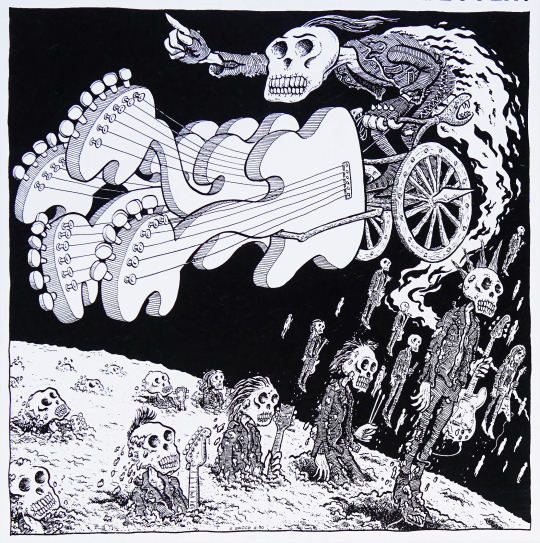
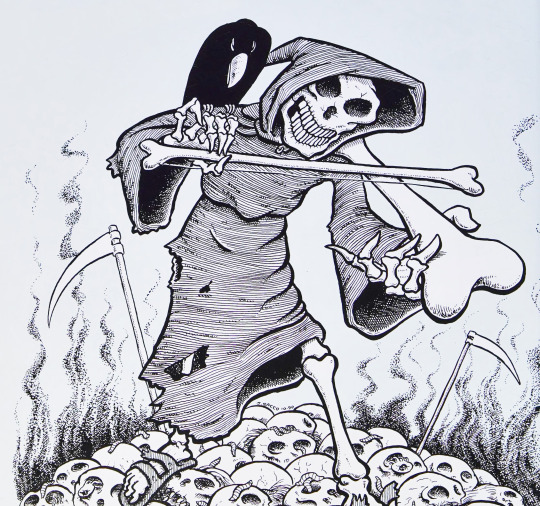
''But I Like It'' by Joe Sacco, 2006
Source
#joe sacco#maltese-american artist#but i like it#cartoonists#comic compilations#skeletons#death#atlantic records#count raven
117 notes
·
View notes
Text


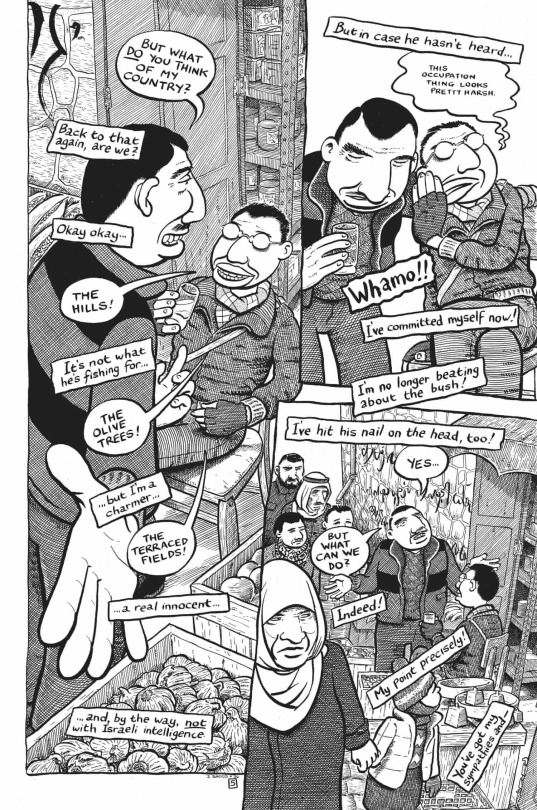
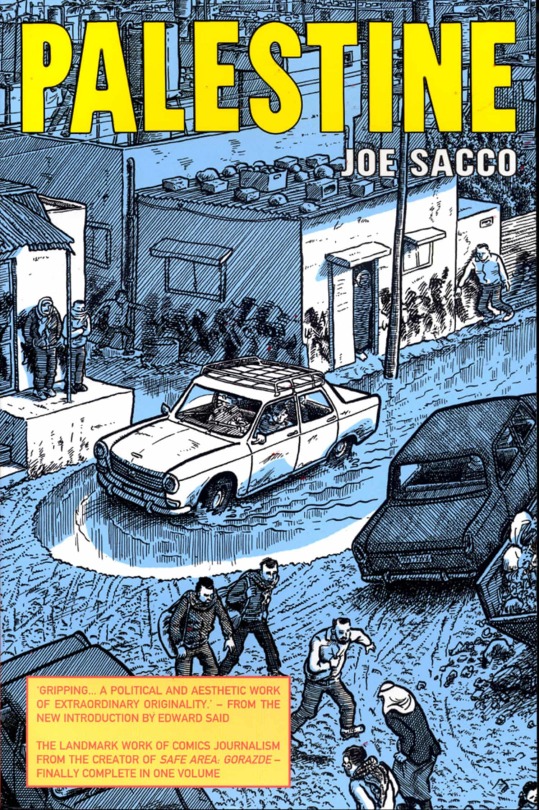
#comics#comics journalism#joe sacco#graphic novel#highly recommended#actually -- all of Joe Sacco's work is great#see if your library has copies#or purchase copies for yourself or friends#nice to see#the guardian#featuring him and his work today
9 notes
·
View notes
Text
Sabrina Fernandes entrevista Joe Sacco | Palestina
youtube
Excellent interview with Joe Sacco, author of the Palestine comics/graphic novel, which is definitely on my reading list now
English with Portuguese subtitles
#free palestine#Sabrina Fernandes#Joe Sacco#Palestine#from the river to the sea palestine will be free#Youtube
8 notes
·
View notes
Text


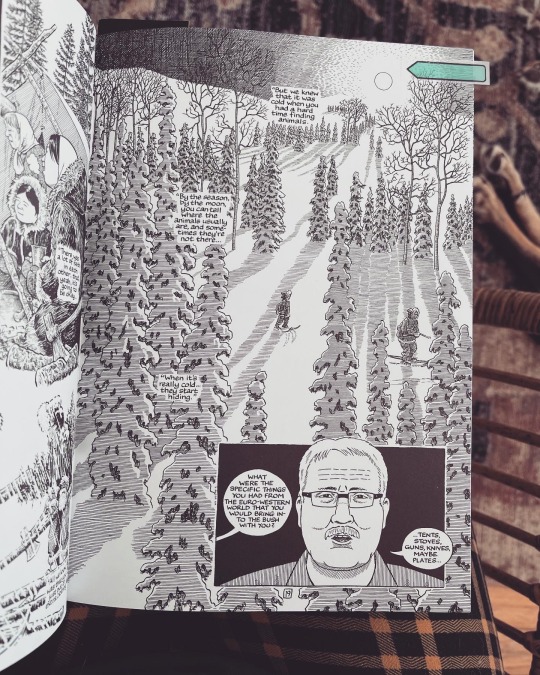
I had to put a sticky tab on this one page because the art of the scene blew me away. Just seeing the trees and snow made me kind of emotional.
📖 Paying the Land by Joe Sacco
#godzilla reads#paying the land#joe sacco#graphic novels#reading#book blog#bookworm#booklr#bookish#booklover#bibliophile
24 notes
·
View notes
Text
Yeah, al-Rantisi was nine years old at the time. And what he told us was at that moment, through all the grief, he remembers his dad wailing and everyone incredibly upset. He said that planted hatred in their hearts. And unfortunately, there have been many instances like that, that have stoked that hatred. So it seemed very important to begin to understand those historical episodes because they’re like the building blocks for what we have today. The building blocks of the context for what’s going on now. And what’s going on now becomes the context for what will happen in the future. So these things are important. It’s important to understand them and it’s important to understand that things don’t come out of the blue. This question, why do they hate us or does the incitement come from textbooks, or something like that, come on. It comes from these episodes in history where people are shot and murdered. That’s where it comes from. And now bombed.
Joe Sacco in interview with Chris Hedges at The Real News Network. JOE SACCO, AUTHOR OF ‘FOOTNOTES IN GAZA,’ ON JOURNALISM AND PALESTINE
Sacco, whose graphic novels marry illustration with cutting-edge journalism, speaks on his career reporting on Palestine and what it means to bear witness as a journalist committed to justice.
Footnotes In Gaza
5 notes
·
View notes
Text
Chris Hedges: .... What is it about Palestine and did Palestine grip you from that first experience? But you’ve invested tremendous time in Palestine.
Joe Sacco: Well, you’re a fellow journalist. Particular stories hit you in the gut and mattered to you for whatever reasons and the whole Palestine thing mattered to me on a personal level because I grew up thinking Palestinians were terrorists. And that began to shift around the time of the invasion of Lebanon in ’81, and then the massacres in Sabra and Shatila when I realized that, something else was going on. Later on, after I got my degree in journalism, I began to look at how journalism had shaped that viewpoint of Palestinians and I realized that’s what it was, I was appalled by what I didn’t know and what I wasn’t told by journalists.
There were a lot of reporting effects like an attack on a bus, a hostage situation with some airplanes, or whatever it was, all of those were facts but there was never any context. And I realized the only time I’d ever read or heard the word Palestinian was with the word terrorism. So in a way, I needed to do penance. I almost needed to atone in my own mind for those misunderstandings and that ignorance. And it became a special passion because I began to see how deeply wronged the Palestinian people were historically and how badly misrepresented they were. And it’s those two things, people deeply wronged and so badly misrepresented, that pulled me in that direction.
2 notes
·
View notes
Photo
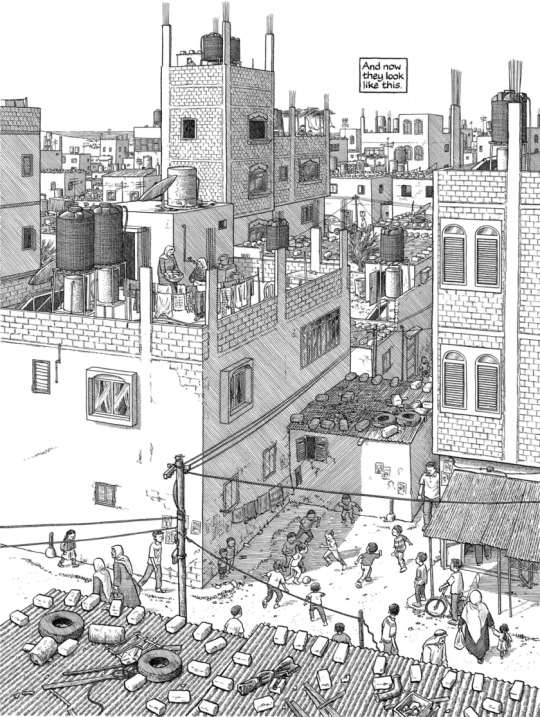
Joe Sacco
Footnotes in Gaza (2009)
Published by Metropolitan Books
53 notes
·
View notes
Text
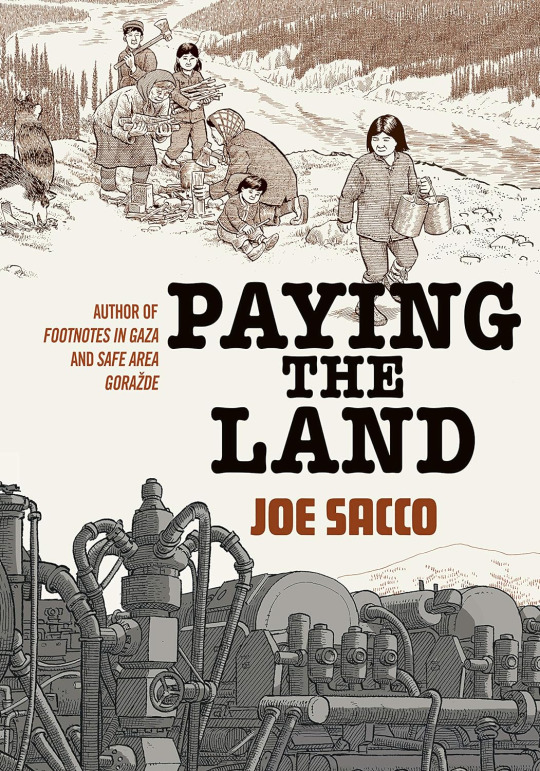
#paying the land#joe sacco#historical#history#graphic novel#graphic novels#nonfiction#non-fiction#jonathan cape#poll
2 notes
·
View notes
Text
Unfortunately, with the Middle East’s twin taps of violence and despair still open, there is all too much for Hanthala to see.
Joe Sacco in the introduction of A Child in Palestine
4 notes
·
View notes
Text

Gary Groth, Michael Dean & Kristy Valenti (ed.): The Comics Journal #302 (2013)
#the comics journal#tcj#comics#criticism#maurice sendak#tardi#joe sacco#gene deitch#art spiegelman#chester brown#mort weisinger#roy crane#fredric wertham#fantagraphics books
1 note
·
View note
